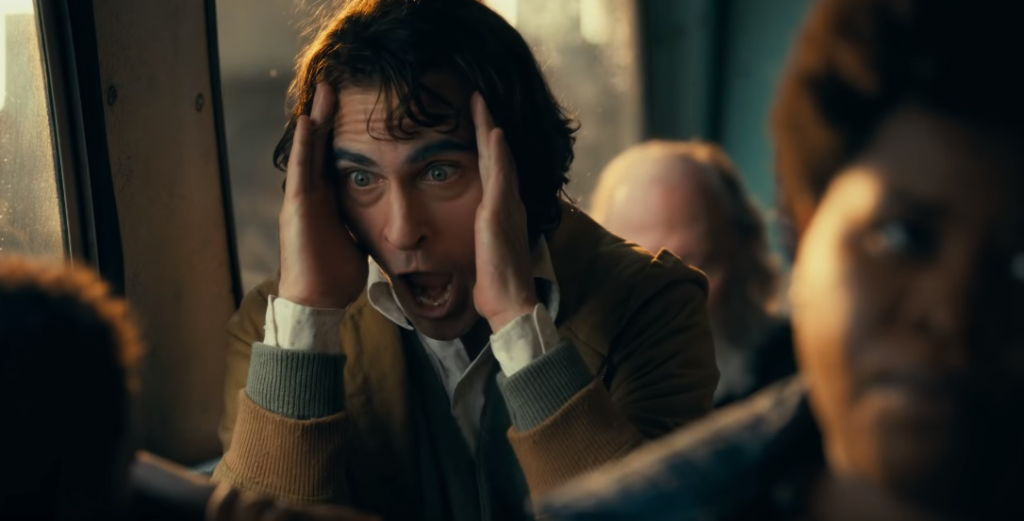Wait a minute, wait a minute, wait a minute. Can it be? Do we have ourselves a rare [x] impressive script? Or, oh my god, wait. Could this actually be BIGGER than impressive? Read today’s review to find out!
Genre: Comic Book/Drama
Premise: A comedian trying to make a name for himself in the 1980s finds himself inadvertently inspiring a movement to take down the rich.
About: When this project was first announced, it was met with collective skepticism. You’re going to create a second Joker in the DC universe? Won’t that be confusing? And while people were down for Joaquin Phoenix playing the Joker, they weren’t as sure about Hangover director, Todd Phillips, helming the flick. Cut to a year later and “Joker” is the leading contender for Best Movie of the Year and Best Actor of the Year. Just the other day, it won Best Film at the Venice Film Festival. Phillips teamed up with screenwriter Scott Silver to write the script. Silver is best known for writing 2010’s, “The Fighter.”
Writers: Todd Phillips & Scott Silver
Details: 120 pages
I was going to wait until this movie came out to review it. But it’s gotten so much love over the last couple of weeks that I couldn’t help myself. I had to read the script. It puts me in a unique position. Usually, when I read a script, the movie hasn’t even been made yet, much less shown to the public. This will be that rare exception where I’m reading something I know turned out great. Now despite Phillips saying this has nothing to do with the DC universe, there are a handful of story choices that tie this version of the Joker directly into the Batman mythology. So if you want to go into this fresh, you probably don’t want to read the summary. If you can’t help yourself, however, I’ll put a bolded spoiler tag around the big comic book-y spoiler. Okay, let’s get into it!
Here’s the first page:
This story takes place in its own universe. It has no connection to any of the DC films that have come before it.
We see it as a classic Warner Bros. movie. Gritty, intimate and oddly funny, the characters live in the real world and the stakes are personal.
Although it is never mentioned in the film, this story takes place in the past.
Let’s call it 1981.
It’s a troubled time. The crime rate in Gotham is at record highs. A garbage strike has crippled the city for the past six weeks. And the divide between the “haves” and the “have- nots” is palpable. Dreams are beyond reach, slipping into delusions.
40-something Arthur Fleck is living a rough life. He takes care of his ailing mother off his “Rent-A-Clown” salary. And both of them are on tons of expensive medication. Arthur’s most prominent medical condition is that he inadvertently laughs during serious moments. This makes it hard for him to connect with people because if someone, for example, tells him that their child just died, this will set off a raucous laughing fit from Arthur.
Meanwhile, Gotham is getting ugly. The trash collectors are on strike so there’s trash all over the city. And violence is skyrocketing. To the point where his co-worker gifts him a gun. “You gotta be able to protect yourself out there,” he tells him. Giving Arthur a gun turns out to be a bad idea. The next day, as Arthur does his clown schtick at a sick children’s hospital, his gun falls out of his pants mid-act. The horrifying incident gets him fired.
Arthur takes this as a sign to focus on what he really wants to do – which is become a comedian. But on the way home on the train, he’s harassed by some drunk Wall Street meanies. They push him and push him and push him until he finally pulls out the gun and shoots them all dead. He then runs out at the next stop, unknowingly beginning a movement. Kill the rich.
That night his mother, who used to work for Wayne Enterprises 30 years ago as a maid, hits him with a whammy. **spoiler** He’s the illegitimate son of Thomas Wayne (this is set up A LOT better than I was able to convey with limited space). **end spoiler** The next night he asks his lovely neighbor, Sophie – one of the few people who’s nice to him – if she’ll come see his act, which she agrees to. Arthur bombs horribly. It isn’t even that his jokes are bad. It’s that he doesn’t have any jokes. He just talks about random stuff.
Little does Arthur know that someone taped his act that night and sent it to Gotham’s number 1 talk show host, Murray Franklin. When they air Arthur’s act for Murray to make fun of, it gets so much attention that Murray asks Arthur on the show. Thrilled that the world is going to finally see his comedy act, Arthur meticulously prepares for his TV debut. Unfortunately, with both Gotham and Arthur’s mental state deteriorating rapidly, the person who appears on Murray’s show may not be the guy they saw on that tape. It may instead be… The Joker.
Can I just say that after the debacle that was yesterday’s sprawling nonsensical failure of a movie, It Chapter 2, how nice it was to get back to SIMPLE STORYTELLING. I’ll be honest, when I saw this trailer, I was afraid the script might be TOO SIMPLE. That they didn’t have enough story. But Silver and Phillips do an amazing job setting up 4 key characters for Arthur to interact with (his mom, Sophie, Murray, and one of his coworkers) and 4 main storylines (his murder of the Wall Streeters and it starting a Gotham movement, him trying to become Sophie’s boyfriend, his mom’s potential delusions with who he’s related to, and his desire to be a comedian).
One of the tricks with screenwriting is that if you know your characters well and you know your storylines well, you don’t need a whole lot else. You don’t need big twists. You don’t need asteroids heading towards earth. You can just cycle in and out of those storylines because they’re all compelling. One scene with mom, one with stand-up, one with Sophie, back to a scene with mom. Sometimes you’ll mix two together, like when he brings Sophie to his stand-up. And they were all good. We cared. We wanted, even though we knew the odds were a million to one, for him to get Sophie. We wanted to know if his mom’s story **spoiler** about Thomas Wayne was true **end spoiler**. We were horrified yet captivated whenever he practiced his comedy because he’s so weird and we know the chances of his success are less than 1%. And we loved that this tiny character piece actually connected Arthur to Gotham in a much larger way in that people started dressing as clowns and attacking the rich, making everything feel bigger, feel like it mattered.
And Arthur himself was so perfectly constructed. One of the hardest things about screenwriting is creating clear compelling characters. Often times a writer can create a crystal clear character, but they’re boring. Other times a writer can create a weird character with five different mannerisms and mental conditions and issues, but they’re unclear. And when a writer does get those two things right, you still have to give us a character we can root for, which is a challenge whenever you’re writing someone complex. It’s hard to combine all three of these things into a single character but Silver and Phillips did it. They immediately explain what Arthur’s condition is – that he laughs when he’s not supposed to. They make it very clear what his goal is – to become a famous comedian. And they do an amazing job building up sympathy for him right away. He gets beat up by a bunch of kids early on. And in a few subsequent scenes, everyone from his co-workers to his own mother put him down (“You want to be a comedian?” “Yes.” “But don’t you have to be funny to be a comedian?”). So we’re instantly rooting for this guy. Every aspiring screenwriter who wants to create a compelling main character needs to read this script.
And really that mastery of character extends to the story itself. There’s so much assuredness on the page of what they’re trying to do. Looking back at that great first trailer for Joker after reading the script, I can totally see why it’s so good. It’s because these guys knew EXACTLY what kind of movie they wanted to make. There’s no guessing here. That was the problem with yesterday’s script. You could see the writer and director trying to work out their story on the page. There’s so much indecision, from the jumping around in time to the never-ending short horror films to the story’s confusing rules (they remember their town but they also, um, don’t remember it?) to the clumsy execution of the never-ending climax. Joker is the antithesis of all of that. It is the culmination of simplicity and clarity. Unlike yesterday, where I was constantly asking, “Why are we in this room right now?” There’s never a moment like that in Joker. You always know where you are and why you’re there.
I honestly don’t know if I have a complaint about this script. I suppose if you’re a DC Comics geek, there are a couple of choices that will get you hot and bothered. But Phillips himself says this isn’t directly connected to the Batman mythology so I say have fun with it. I know I did.
[ ] What the hell did I just read?
[ ] wasn’t for me
[ ] worth the read
[xx] impressive
[ ] genius
What I learned: What I was most impressed by with this script is how the writers used some of the simplest most time-tested devices to get us to care. For example, having bullies beat up Arthur early on immediately puts us on his side. And here’s another technique you can use that’s a huge cheat but, for whatever reason, nobody picks up on on how much you’re cheating. Early on, put your character in a therapy session. What this does is it allows someone to ask your hero very personal questions and therefore we get to know him intimately quickly. Here, it’s not a therapist, it’s a social worker. But it’s the same device. And in a movie where it could be confusing to understand what makes this odd man tick, that scene got us into his head and helped us understand him immediately. This script is such a huge win for the power of simple time-tested storytelling techniques. I’m thrilled that it’s going to be celebrated all the way until March, when it will take home all the awards.
What I learned 2: Never write a character who’s “crazy.” Crazy is too general. It is undefined. Your character will be a huge failure if you try to write “crazy.” Arthur is just a guy who wants to connect with the world and doesn’t know how. Phillips and Silver also give him a laughing condition that adds another layer of complexity to the character. But that’s it. That’s all that’s going on here. And that’s a huge reason why this character works so well.



